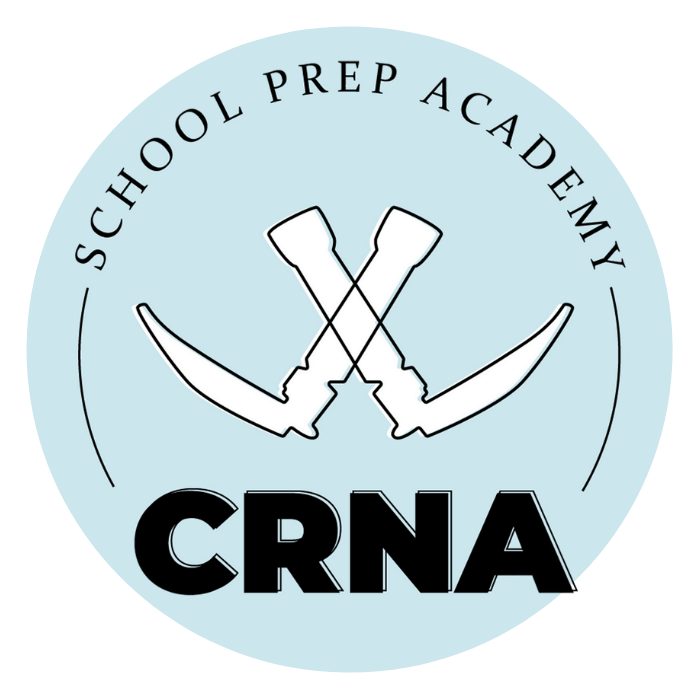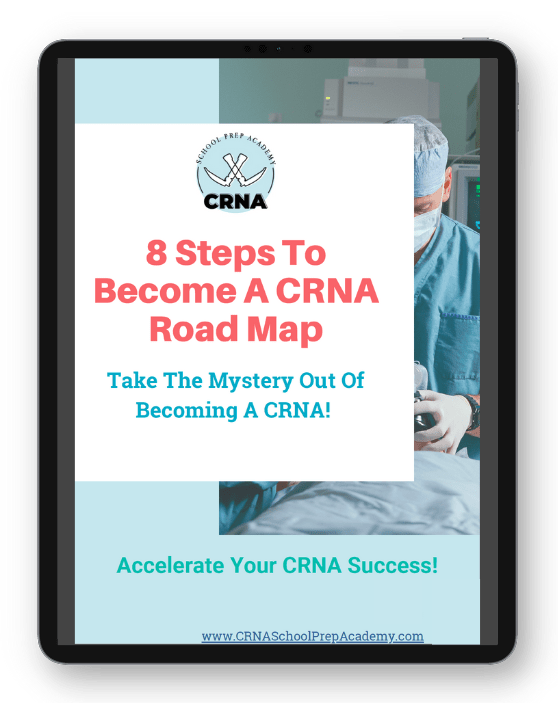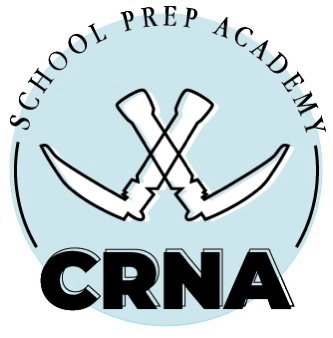
Looking to sharpen that ax before your interview? Learn more about the group mock interview coaching we do with our students inside CRNA School Prep Academy through today’s sneak peek episode!
Richard Wilson, CSPA’s expert contributor and program faculty director for over 11 years, conducts these powerful coaching sessions inside the academy. He has sat through and ran hundreds of interviews for future and current CRNA candidates, and today he is spilling the tea!
In today’s episode, you’ll find out more about-
- How an actual program interview would be conducted
- The small details that make a HUGE difference in your interview success
- How early you can start practicing your answers to questions (It’s earlier than you think!)
- A detailed look at possible interview questions and their structure
- Success tips for a virtual OR in-person interview
- What programs are really looking to learn about YOU throughout the interview
- The importance of eye contact and tone of voice
We always believe in you, future CRNA! So on your next interview go get that YES! We’re rooting for you!
Get your Free list of Interview questions here!
https://www.cspaedu.com/
Get access to planning tools, valuable CRNA Faculty guidance & mapped out courses that have been proven to accelerate your CRNA success! Become a member of CRNA School Prep Academy here:
https://www.crnaschoolprepacademy.com/join
Book a mock interview, resume edit or personal statement critique:
—
Watch the episode here
Listen to the podcast here
Mock Interview Coaching With Assistant Director and CSPA Expert Contributor Richard Wilson MNA, CRNA
I want to share a very special episode with you. We’re going to give you a taste of the group mock interview coaching that we do for our students inside of CRNA School Prep Academy. I hope to see you there for the next coaching session. I hope to see you take advantage of this. These coaching sessions are done by an expert contributor to CSBA, Richard Wilson, who has been an Assistant Program Director for several years. He has sat through hundreds of interviews himself, and has given interviews to future and now current CRNA students. These sessions are extremely valuable.
While the session is almost two hours long, we are going to give you about a 30, 40-minute taste of what value you can get out of these sessions. I hope you enjoy it. Don’t forget, at the end of this post we have linked to a free download with over 100 real CRNA interview questions. You can also book a mock interview session. Make sure you grab your goodies. Thank you so much. I hope you enjoy.
—
It’s good to see everybody. I’m glad to have everybody here as we are looking at CRNA School Prep Academy’s first group mock interview session that we’re going to do. Jenny and I did one of these sessions and hosted it when we did the conference back in October. It was a big success, a huge hit. One of the things that kept coming up in some of our evals from that conference was, “Keep doing it. We want to see more of that.” It was exciting. It was very nice to see. I’m glad that there was that much feedback from it.
This is the session. I’ll give a little bit of background of who I am for those of you that are not familiar with me, a little bit of my credentials so that you understand a little bit of where I’m coming from as I give feedback. I’ve got a list of questions. What I’ll do is I’ll choose some people and ask you to answer this question for me. I’ll ask you pretty much in some of the same tone, the same manner that you will be asked in an interview. Hopefully, you might sweat a little bit.
What I want to do at the end is I want to give you some feedback. I’ll go through some of the things that you did well with it. I’ll go through some of the things that could maybe use a little bit of work on so that you’ll have that confidence when you leave here that things are good. I’ll ask the question; I’ll give you feedback on your tone, knowledge base, your demeanor as you answer it, all of those little things that I think make a difference through the interviews.
For those of you that do not know me, my name is Richard Wilson. I am a Nurse Anesthetist. I’ve been practicing anesthesia for several years at a Level 1 Trauma Center. Also, I am a Program Faculty Member. In 2009, I was hired to open a satellite campus. I’ve been an Assistant Program Director since 2010 where I opened a satellite campus for our program. I have been working there in the academic area, the clinical setting and simulation for many years as I’ve been a program faculty member.
I have sat on interview committees. I have chaired interview committees. I have probably interviewed close to 800 or 900 individuals, and counseled hundreds more on getting to anesthesia school. That gives you a little bit of a background of who I am. We want to get into some of these conversations and questions. We’re going to touch on emotional intelligence and clinical questions.
When we look at clinical questions, that has to do a lot with your background in the intensive care unit or the emergency room, PACU, general floor, or anything that you have on your resumé, anything that you have as a clinical experience in your application. When I talk about clinical questions, to give you an idea as you’re thinking about a lot of these that they come from- it’s going to be the things that you think about- the pharmacology. Any of the medications you’re using, and looking at the receptors, their mechanism of action, the side effects, the indications for using it, when would you not use it? What do you do when it doesn’t work anymore?
They’re going to look at the monitoring devices. That may depend on what unit you’re on because if you’re in a CVICU, you’re not going to have an intracranial bolt or EVD. If you’re in a neurotrauma unit, you’re not going to have an Impella, for example, or worry about an intra-aortic balloon pump. They’re going to look at the monitoring devices and then they’re going to look at ventilation modalities. Do you understand what’s going on with the vents?
I know a lot of you don’t get to touch on vents, and we’re going to touch a little bit on that moving forward. You don’t get to touch the vents at all per se, but you still need to know about them and we’ll talk about why. Clinical experience is also going to come into the monitoring of the medications and the protocols that you use within the units. That’s a lot to do with the clinical side of it.
Emotional intelligence has to do with how you see yourself and how you view the world around you, what contact do you have with that, and can you look into yourself and see what’s going on with you and determine what reaction you’re going to have or control your reactions based on what the environment is about. Some of that seems like clinical questions when it’s asked because when they say, “Have you had a confrontation with a physician or a coworker? Have you made a medication error?” That, honestly, has nothing to do with clinical practice. It’s testing emotional intelligence.
When you prep for interviews, you’ve got to prep for interviews way ahead of time. If you’re waiting until the last minute, you’re behind the eight ball. This is why I say that. What we want to look at when you’re talking about prepping for interviews, it’s got to start before your application even starts.
I always say preparation starts the first day you walk into the unit, or even before that sometimes when you’re in nursing school, but it’s got to start before the application starts, and this is why: You look at most programs when they go to interview, they might give them six weeks and say, “We’re going to interview you in six weeks.” Well, I’ll tell you something we did… We had some drop out of the interview process; they got accepted to another school and didn’t want to take a risk or chance. They went ahead and declined our interview and accepted a position somewhere else.
So, we called some other people and I said, “Can you join us in ten days to interview?” We never got turned down. They had ten days to prep. That’s a very short period of time. You need to start prepping way ahead of time in practicing these questions over and over again. You know people are going to ask you what your weaknesses are, correct? How do you think they’re going to ask that question?
I think they’re going to say, “Do you have weaknesses?”
That’s what most people think. However, there are probably four other ways to ask that question. Most people focus on practicing the question of “what are my weaknesses”, then can say, “I can answer that. I’ve practiced that one 100 times already, and I know what it is.” However, they may say, “What would your coworkers say is your weakness?” It may be the same exact thing but just because they rephrase it, say to your coworkers or your manager or your professor in nursing school, you start going, “Now I’ve got to think about what somebody else thought about me and I have to answer that?”
You have to understand, the program faculty interviewing you has no clue what your manager would say your weakness is, and we understand that. It doesn’t have to be that your answer is different. You’re approaching it in a different way. What I find kicks a lot of people in the butt when we do interviews and the alternative way to the question is asked because they’ve practiced questions so much, they think, “It’s going to be asked this one way.” When they ask it a different way, people think, “I’m not sure I know how to answer that. I’m not sure what to do here,” because it was asked in a different way than what they anticipated.
Let’s talk about timing with these things also. You only have a couple of minutes. Some of these interviews are only 20 or 30 minutes long. They want to get multiple questions out of you. They don’t have ten minutes to listen to you explain why you want to go to anesthesia school.
What we’re going to talk about is sometimes how can you take those, narrow it down, give the highlights, but lead them enough where they’re interested in it so that they will say, “You said this. I want you to expound on that a little bit more.” You’re teasing them a little bit. You’re taking them down the line.
I want you to understand, I am a program faculty member. I have a good tendency or I like to think I have a good ability, to separate my role as a program faculty member and my role in CRNA School Prep Academy. They are completely two separate roles. I work in two separate entities, two separate venues with that.
This is why some of the stuff I say, you’re going to say, “Is a program faculty member saying that?” I’m speaking to you as a mentor and a guide through CRNA School Prep Academy. You have to understand, when you go into an interview, as a program faculty member, what am I going to want to do? I want to know as much about you as I can. I’m going to want to control the interview because I’m the one who wants to know the information about you, and so I’m going to control the interview.
However, there are techniques and tactics as an individual that you can take if you’re interviewing to help guide the interview maybe towards where you want it to go, and get the information out that you want without saying, “This is what I want to say,” or without looking like you’re not answering the question because you want to say what you want to say. You have to be careful about that. I’ll talk about some of those tactics. Let’s go ahead and keep moving forward with you with our first question. Tell me real quickly, where do you work?
I work in the MICU SICU unit in Houston, Texas as a travel nurse.
You’ll see me looking down because I’m writing some notes. That’s great. What drew you towards Houston, Texas, as an assignment?
I’ve been in the Houston, Texas, area since 2017. My wife and I made the decision to move over to this area, and that was the decision that I made to start a travel nursing thing that I was looking towards anesthesia school.
Tell me quickly about the typical type of patient as a traveler that you’re getting in that MICU SICU.
Lately, the typical patients we’ve been getting are COVID patients, but we do get hypertensive patients, patients that are in shock. The unit that I work in is not a CVICU but we do recover open-heart patients as well.
You told me that COVID was your primary is what it sounded like while we were talking there. Out of curiosity, because I’ve heard a lot about this whole proning thing, we didn’t do that when I was back in the early 2000s. We had these RotoProne beds, but a lot of my colleagues now have been going up there and proning people on the floors. What is this for? Why are we doing this proning?
The whole premise behind proning is to improve oxygenation on the patients. The patient usually would lay supine, so we’ll take this patient that is laying supine on their back and flip them on their stomach. The whole goal is to help recruit alveoli and help them with the ventilation and perfusion process.
You said ventilation and perfusion. I’ve heard those terms before. Is there a mismatch? That’s where I heard, ventilation-perfusion mismatches. When we look at ventilation-perfusion mismatches, somebody was trying to explain this to me. Shunt and dead space. Are you familiar with those terms?
Interview preparation starts the first day you walk into the unit, or even before that sometimes when you're in nursing school, but it's got to start before the application starts. Click To TweetI don’t want to guess, but dead space, usually it’s the areas where there’s not enough ventilation coming into.
I walked you down a bunch of questions right there, and you did well. The reason I asked them as a faculty member is to see what I was looking for in some of those questions and how he did. One thing is, this is a virtual interview. This is a process that sometimes you may have to have as you’re going through anesthesia school. You may not always be face-to-face, so I’m going to try to give you some advice if you are sitting face-to-face with an interviewer or whether you’re doing it virtually.
Virtually, you did a great job. You stayed connected with me. I felt like you were talking to me the whole time. I did not feel like you were looking off. Every once in a while, you’ll see people roll their eyes off a little bit or look away a little bit. We know that’s all thought processes as we’re trying to think our minds and our eyes go up. Somebody was telling me they read an article that states if you look up and right, you’re thinking. If you look down and left, you’re cheating.
Anyways, you did a good job; you came right back on point with me and looked at me because it’s hard, especially during a virtual interview or even in person when you’re thinking about it, to look and stay connected. In virtual, you’re only looking at the camera. It’s a little bit easier because then everybody feels connected to you because everybody feels like you’re looking at them.
When you’re in a personal interview, don’t forget to look around a little bit because you don’t want to get so focused on somebody that you’re not picking up on some of the other reactions going on and being cognizant of everybody else. I usually tell people, “Scan the room.” Obviously, when you’re answering, the first person you answer to is the person who asked the question. Once you get going with them, you can scan to the other people a little bit as you answer it.
That way, if they get a confused look on their face and you go, “I’m sorry. Did something I said didn’t make sense or can I explain something a little bit more for you?” They are feeling like, “Not only was he answering the question, but he stayed engaged with me. He’s got very good awareness of his surroundings.” I asked you why did you do Houston, Texas, as your first travel assignment? That’s going to get multiple factors in.
One, are you honest with me? We can tell. We know a lot of stuff about travel assignments now. It’s money, COVID burnout or unit burnout. There is nothing wrong with that. We’re trying to see the thought processes of what people are doing. We used to do this a good bit too before COVID. People would say, “I’ve never traveled to San Diego. I’ve heard it’s beautiful, so that’s where I went for our first assignment or I like skiing, so I always make sure I’m at this place in the winter when I travel.” That’s fine. It gives us an idea of personality too. That’s an interesting way of reasonably asking that.
It also gives us an idea about support systems. He told me that he has a support system in Houston, Texas. He’s got a wife. He’s got a family that if he’s in the Houston area, they can support him, but then it may come up later and be prepared for later on this interview that if we were going to continue it to say, “You mentioned your wife. She’s back home in Houston. Support systems are big. Are you going to be able to bring her here with you? Is she going to come to South Carolina or Georgia or New York or wherever you go to school? Is she going to come with you or are you going to be coming by yourself?” That’s additional stress and strain that they’re going to take into consideration.
You don’t want to laugh at them about it, but it opens the door for them, and it also gives you a chance now that we ask that to say, “She’ll be coming with me or no, she won’t and here’s what our plans are.” It shows them that you’ve thought about this. This is not a fly-by-night, “I just put my application in two days before the deadline,” thing; it shows that you’ve thought about what you want to do. They want to see that you plan this out if they’re going to take a risk on you.
You may have a 3.9 GPA. You may have a 320 GRE and you may have three years of experience in a good ICU, but every time we accept somebody into anesthesia school, we’re taking a risk on them. Just because you are a great nurse or a well-educated person, doesn’t mean you’re going to be successful in nurse anesthesia school. Jenny and I are going to record an episode on that. I’m excited about that one. We’ll about it how takes more than being a good nurse to make it through anesthesia school.
I asked you about proning because you told me that COVID patients were the main thing that you were taking care of in the ICU. That was very good. You opened up well. However, if you noticed, I paused. I didn’t say much. I let you start to go from there. You’re going to see faculty members do that because then you started to say, “There’s COVID, then it’s this and we don’t see much of this, but we have this.” Be careful with that. You’re going to see program faculty members and interviewers pause. Silence is okay. Silence seems awkward. How many of you love silence?
When you’re talking to somebody and silence comes about, everybody is like, “Did I say something wrong? Did I not say enough? Did I say too much? Were they even paying attention to me?” Silence is interesting. What we see is when people get nervous, silence by others causes them to talk more. They think, “I didn’t give them everything they wanted.”
In this, you told me you didn’t do cardiac patients, but you did take some open-hearts. Here’s the risk. I may say, “We were going to talk about COVID and you’re comfortable talking about COVID.” I might say, “You mentioned open-hearts. Let’s see what you do know about those because if you’re going to take care of them, you need to know something about them.”
It’s not a patient population that you’re very comfortable with, but now you’re going to have to answer questions about it. Be careful about how you answer the question. Also, what was the question I asked? “What’s the most common patient you take care of?” There’s only one most, one best, one least and one worst, so you don’t have to expand. You say, “It’s the COVID patient or it’s the open-heart, post-open heart or it’s the neurotrauma patient.” They didn’t ask about the entire unit. They only asked about the most.
Sometimes, they will say, “In your units, what are the typical patient loads you take care of?” “Let’s try to expand that.” Usually, if they say most, anticipate that what they’re about to do leads you down a clinical question route on that type of patient they asked you about. Shunt versus dead space. I asked you a little bit about shunting and dead spacing. You don’t have to know everything about that and that’s okay.
You did well with it because you said, “I’m not sure about the exact answer on it, but if I’m not mistaken, when you have dead space, you have this.” That’s okay. I like that. I like seeing people walk that line, and it’s what I call short share knowledge, and here’s why: When you think about sharing knowledge base- because the first person that always answers these questions is the hardest- now everybody is getting feedback that they can use for the next questions.

When you talk about walking the line, answering a question, and giving us some knowledge base, let’s say I asked you about 4 or 5 questions and all you said was, “I’m not sure. I don’t know. I’ll ask somebody. I’ll find that out.” You probably had some knowledge base because all of you are very brilliant people. You wouldn’t be where you’re at now, you wouldn’t be trying to go to anesthesia school if you are not smart people. Plain and simple. It’s whether or not you have that confidence.
We were looking at a bunch of application files and interviewing people. I have fifteen years of nurse anesthesia experience and ten years or more as a program faculty. I have sat on national committees for writing exam questions. I’m mentoring, and I’m still not sure I could get into anesthesia school these days with my statistics. You are all very brilliant people.
The problem is a lot of you think that the program wants the exact right answer. Sometimes, they don’t care about the right answer. They just want to see how much knowledge base you do have. In other words, “I’m not sure about shunting and dead space, but I know I’ve heard those terms. When I heard those terms, what they had to do was basically with ventilation and perfusion of the lungs. One has to do with not being able to ventilate, but you’ve got good perfusion. One has to do with no perfusion but plenty of ventilation. I can’t remember which one is which, but I do know they’re centered around those.”
You see how right there, I still didn’t give them a perfect answer. I didn’t give them the, “I know what the shunt is. I know what the dead space is.” What they were able to figure out was I knew about pathophysiology within the lung, and that I knew ventilation and perfusion, and how they correlate together and how I may be able to infer some things from there.
If you always come up and think, “I’ve got to have the right answer,” and you only answer, “I don’t know. I’ll get back to you. I’m not sure,” then what we end up with is a bunch of I-don’t-know’s and nobody else has a clue what you know, so good job on that!
We’re going to move to another question. How are you?
I’m good. How are you?
I’m doing well. Where are you from?
I’m living in Pennsylvania. I’ve been here for many years. I’m from New England originally.
Thank you for coming to our interview. We’re so excited that you joined us. Looking at your resumé here, there are a lot of great things that I see on your resumé. What would you tell me though, in your mindset or your thought process, is the greatest accomplishment out of all of these things I see here?
I feel that my greatest accomplishment is when I’ve wrapped up precepting a person and they’ve jumped into the deep end. They go on to start to get the whole ICU process and I continue mentoring them every time. I see somebody go from scared and nervous when they first start to gaining that confidence and moving into often being an independent nurse. It’s an amazing feeling.
How long have you been precepting?
About two years.
How many have you precepted over those years approximately?
I had my daughter, so my precepting schedule has been a little jumpy, but I’ve primarily precepted three people. Then we tend to have a variety of other preceptees hop in and out, but we’re pretty close in that unit. We all feel like a big family when we precept.
How big is your unit?
They’ve adjusted the size, but now, we have sixteen beds.
Just because you're a well-educated person doesn't mean you will be successful in CRNA school. Click To TweetWhat type of unit are you in?
I’m in the medical-surgical ICU.
Thank you. Great answers. Great job. This was an emotional intelligence question. What she was doing here is we’re looking at what drives her. What is that thing that makes her feel good? What drives her and what keeps her going each and every time that she’s in that unit? What we found out was, we can interpret this as a love for people. She enjoys people. She’s probably going to be a good team player. She’s going to work well with others and classmates because she’s going to be coming into a program that potentially has 30, 40, 50 people. They’re going to be from all over the nation and she’s going to have to adjust to them.
We see that she did a good job portraying that she wanted to mentor people; seeing that accomplishment, seeing them become proficient at what they do and be able to go on and practice on their own. However, she still liked that feeling that they came back to her over and over for additional advice within the unit. We see that.
She opened the door about a personal life when I asked her about how many she precepted. One thing I would say is you led with, “I had my daughter and so I’ve only precepted around three.” Congratulations, by the way. What you did in that whole scenario was you switch the conversation in a way you didn’t want to because you had a very positive feeling going. Nothing wrong with having a daughter. Congratulations. God bless you.
I see what you’re saying though about taking that out.
It’s great to mention your daughter, but you’ve now opened the conversation to a personal one where somebody may say, “You’ve got a daughter. If you’re going to come to school in Illinois, do you have a support system? It’s a hard program.” Be prepared for those questions. I’m going to be honest with you. If you’ve got a family, there is no way you’re going to keep the conversation about a family out of this. You have to figure it out at some point.
However, what I think you probably better often doing in this scenario is when you say, “I had a daughter, so I’ve only precepted three,” you’ve now switched to where it almost sounded like you were using your daughter as an excuse of not having more. If you would start off with, “I precepted three and that went real well. I enjoyed it. I had to take a little break because I had my daughter. After the break, I’m planning on getting right back into it, but I do have some others who are not my preceptees but do come to us for advice.” Do you see how the whole different perspective is there?
It’s so tough with the phrasing sometimes when you’re on the spot.
That’s why we’re practicing here. That’s why I want to give you advice here on thinking about the phrasing because you’ve got the same concept. It’s just that phrasing makes a difference in the mentality. It’s the order of the phrasing sometimes that plays the entire role in that. I think you did well overall, but you want to be careful about what order you do phrasing and how you do it.
Thank you very much.
Thank you. How are you?
I’m great. How are you?
I’m good. Have we met?
We have. I was at the conference.
I thought we had met. It’s good to see you again. Tell me a little bit about what unit you work on.

I work in a CVICU.
I’m sure that’s a very challenging unit. What kind of patients do you get?
We do a lot of heart failure patients and post-surgical patients.
Which patient population would you like to talk the most about?
I’m pretty comfortable with both, so let’s go with heart failure.
In your heart failure patients, do you talk about eccentric versus concentric ventricular hypertrophy?
Not to that extent. I haven’t heard much about that, to be honest with you, but I know about hypertrophy of the heart. I don’t know about the specific types of hypertrophy, but I do know about hypertrophy of the heart.
What are some of the key things I need to worry about with heart failure patients?
Heart failure patients, you want to make sure that they’re not getting too volume overloaded because the heart cannot pump adequately. You don’t want the lungs to start getting backed up and going through respiratory failure. You also want to make sure that they have adequate perfusion.
Would this have anything to do with Frank-Starling Law?
It does. The Frank-Starling Law has to deal with the volume in a patient and how volume resuscitated you can get a patient. From what I understand, you can get up to a certain point of volume before you are overworking the heart too much.
What do you mean by overworking the heart?
From what I understand, there’s a certain point in the Frank-Starling Law where you have optimization of heart function as far as the amount of volume. If you give too much volume, you’re overworking the heart because it’s trying to pump too much volume, but if you don’t have enough, then you won’t have enough to perfuse the body.
You talked about perfusion. What factors play into perfusion?
You’re looking at how adequately your organs are getting blood, which could deal with preload. We could do it with an afterload or with the amount of squeeze that your heart is getting or contractility.
I’m assuming you probably get these heart failure patients and do a lot of arterial lines.
Interviewers do not usually care for the right answer from you. Sometimes, they just want to see how much knowledge base you have. Click To TweetWe do.
What data can I get from an arterial line?
From an art line, not only are you getting the blood pressure of parameters, you’re also getting maps, which are going to be able to tell you how well the organs are perfusing. You’re also able to tell your map, your blood pressure, how well the contractility is. With the waveform, you’ll be able to tell if you’re getting good systolic versus diastolic pulse pressure.
Have you heard of the term DP over DT?
I’m not very familiar with that.
Maybe that’s an older term. I’m dating myself, but it’s a change of pressure over a change of time, DP over DT. Basically, it has to do with the anacrotic limb of the arterial line. Do you know which side the anacrotic limb is?
Not very familiar. I know you’re referring to the upstroke before the dicrotic notch.
It would be the upstroke. What is the upstroke on that arterial line? Tell me.
If I’m not mistaken, the upstroke of the arterial line is telling you that the heart is going into systole. It’s the beginning of systole when your ventricles are contracting and you have the major force of the blood running through the blood vessels.
Could it tell me then by the slope of that or the DP over DT that I was talking about? Could that tell me whether my heart has a contractility issue or not?
I’m not quite sure, but I would assume that it could, at least.
A couple of phrases you used there. We ran through several different scenarios. Did you see how I walked you from one topic to the next, but how they all correlated with each other?
Yes.
I walked you from one neck, one-to-one, moving along those lines. What I want to look at here are a couple of things you said, “From what I understand.” You said that about 3 or 4 different times. You want to be careful about using phrases like that over and over again. Using them once is okay. Using them twice when they’re in different parts is okay like in the beginning and maybe if you say it a little bit towards the end, but you said it several different times in a row. You want to stay away from that.
The reason is because you want to show some confidence. We don’t mind you saying, “I don’t understand this,” but you want to have confidence. If you’re staying on the same topic, you want to give them some information. Another phrase you used was, “If I am not mistaken.” That goes along with that same thing.
However, at the very end, you have not used it for a while. You then said, “I’m not sure,” but the way you followed it, you said, “I’m not sure but,” and you followed it with a very confident answer that flowed very well from there. That was good. Make sure that you think about the topics that they’re going to talk about.

With Frank-Starling, you did well. There are still some other topics that are associated with it. When you look at Frank-Starling, that has to do with a stretch of the heart. It’s not volume. It’s more about stretch, but everybody says volume. When I was in ICU, CVP was all about volume. It wasn’t until I got to anesthesia school that I realized CVP was pressure. It had nothing to do with volume in the heart. It has to do with pressure on the right atrium. You could be fluid volume-depleted and have a high CVP if you’ve got high intrathoracic pressure because it’s measuring.
I can get started on that for days. I love education, but I want to make sure that you know as much as you can. Think about topics that are key to you. Think about those like Frank-Starling and learn it in detail. You did a good job understanding arterial lines, understanding the details. Understand if you’re talking about post-surgical cases, you’re going to look at those and understand Swans if you are using those on a consistent basis.
Make sure you know what topics that the big ops are going to ask on, and get those pretty much down pat. The other thing is you did not answer my question when I first asked it. I said, “What kind of patients do you take care of?” The first thing you said was, “In the units, here’s what we do.” I didn’t ask the unit. Answer their question.
I didn’t even realize I said that.
That’s okay. This is just fun. At least, it’s fun for me. You did great answering the question. I thought you did a very good job, but answer what they asked you. You may say heart failure and post-surgical, but you may not do a lot of post-surgical patients. You may do mostly heart failure, then they’re going to say, “Let’s talk about post-surgical. Why don’t you do post-surgical? Are you not qualified to do that?” You are. We know that, but you don’t want to give them any ability to question that stuff. Good contact with me. You flowed well. With your voices, they stayed at a good level. I saw inflection up and down. It wasn’t straight monotone, but both of you did very well. Good job.
Thanks.
—
I hope you found that as helpful as I did. I’m rooting for you. Whether it’s your 1st, 2nd or 3rd CRNA school interview, I want you to get the yes that you so desperately dream of. I hope to see you inside the academy for our next session. I also hope in the meantime that you go ahead and download your CRNA school interview questions.
Also, remember to book your one-on-one mock interview session. It is not too early to start practicing now. If you gained anything out of this whole episode, I hope you realized that you could be asked to interview with very little notice. You should be preparing for your CRNA school interview now. You take care. We’ll see you in the next episode. Thank you so much.
Important Links
Get access to planning tools, valuable CRNA Faculty guidance & mapped out courses that have been proven to accelerate your CRNA success! Become a member of CRNA School Prep Academy here:
https://www.crnaschoolprepacademy.com/join
Book a mock interview, resume edit or personal statement critique:
Join the CSPA email list: https://www.cspaedu.com/podcast-email
Send Jenny an email or make a podcast request!


